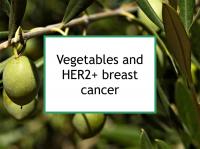The current webpage is designed to make additional research available concerning how various vegetables and vegetable components influence HER2+ breast cancer and treatment with trastuzumab (Herceptin). At the bottom of this webpage are links to studies relating to the beneficial vegetables in Foods to eat & avoid for HER2+ disease and Foods to eat & avoid during trastuzumab treatment.
The following vegetables or their extracts have been tested and found specifically to inhibit HER2+ breast cancer:
Cruciferous vegetables such as broccoli affect breast cancer primarily through the actions of sulfur-containing compounds such as allyl isothiocyanate (AITC), benzyl isothiocyanate (BITC), and phenethyl isothiocyanate (PEITC), as well as sulforaphane, I3C and DIM.
Vegetable consumption also inhibits HER2+ disease through the actions of various polyphenols, among them
- Apigenin (found, for example, in artichokes, bok choy, celery)
- Capsaicin (hot peppers)
- Cucurbitacin B & D (cucumbers, pumpkins, zucchini)
- Anthocyanins (purple carrots, purple sweet potatoes, red onions)
- Luteolin (artichokes, celery, radicchio)
- Lycopene (red or orange bell peppers, tomatoes)
- Oleocanthal (olive oil & olives)
- Quercetin (hot peppers, onions, romaine lettuce)
as well as folate (turnip greens and other greens) and melatonin (tomatoes). Note that trastuzumab treatment is enhanced by the same micronutrients.
Please read the applicable food webpages when making your own food lists since these pages contain important advice, food rankings (e.g., highly recommended, recommended in moderation), consumption limits, and other pertinent information.
Vegetable compounds should be obtained by eating vegetables rather than taking supplements. When a beneficial micronutrient is administered at low doses by consuming food, it is likely to have subtle chemopreventive effects, whereas the same compound administered at high doses is more likely to have pharmacological effects, with possible unwanted outcomes. For example, intravenous administration of folic acid (the synthetic form of folate used in supplements) has been reported to result in mammary tissue hyperplasia and increased expression of HER2 in healthy mice.
